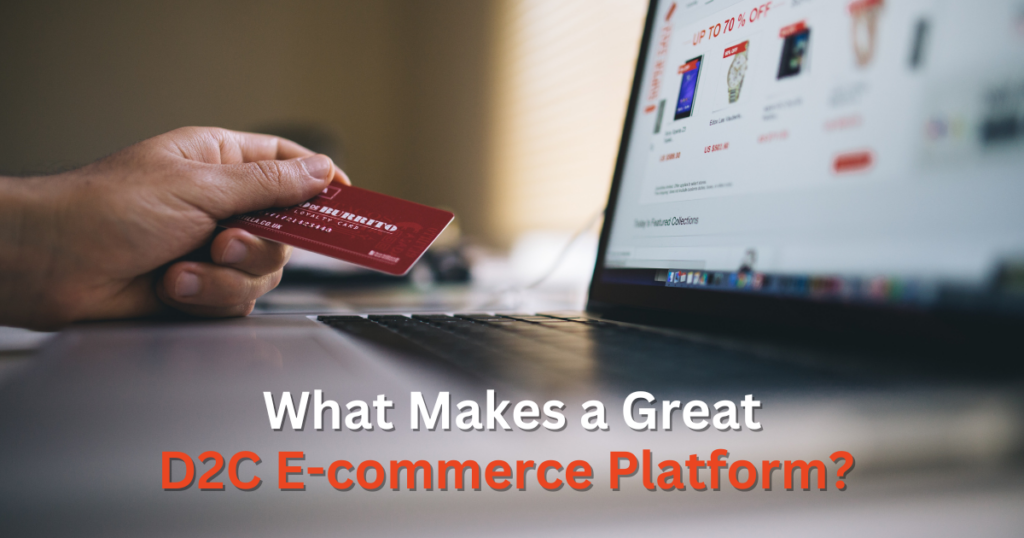
What Makes a Great D2C E-commerce Platform?

In the ever-evolving world of e-commerce, direct-to-consumer (D2C) platforms have gained significant popularity. These platforms enable businesses to sell their products directly to consumers, bypassing traditional retail channels. As the demand for D2C e-commerce continues to grow, it becomes crucial to understand what sets apart a great D2C platform from the rest. In this blog post, we will delve into the key features, benefits, trends, and examples that contribute to the success of a D2C e-commerce platform.
Key Features of Successful D2C Platforms:
The best D2C e-commerce platforms share some common features that drive their success. These include seamless user experience, mobile responsiveness, robust inventory management, integrated payment gateways, efficient order fulfillment, and customer relationship management (CRM) capabilities. By incorporating these features, D2C platforms can streamline operations and enhance customer satisfaction.
Choosing the Right D2C E-commerce Platform:
Selecting the appropriate D2C e-commerce platform for your business can be a daunting task. Factors such as scalability, customization options, integration capabilities, analytics and reporting tools, security, and data protection should all be considered. This section provides insights into evaluating different platforms and making an informed decision that aligns with your business requirements.
Benefits and Advantages of D2C Platforms:
D2C e-commerce platforms offer numerous advantages for businesses. They eliminate the need for intermediaries, enabling brands to establish direct connections with their customers. This section explores the benefits of increased control over branding and customer experience, improved profit margins, valuable customer data, and the ability to build lasting relationships with consumers.
D2C E-commerce Platform Trends:
To stay competitive, it is crucial to stay abreast of the latest trends in the D2C e-commerce space. This section highlights emerging trends such as personalized shopping experiences, subscription models, social commerce, voice commerce, augmented reality (AR), and virtual reality (VR) integration, and the growing importance of sustainability and ethical practices.
Successful D2C Platform Examples:
Examining successful D2C platforms provides valuable insights and inspiration for businesses. This section showcases notable examples of D2C e-commerce success stories, highlighting their unique strategies, customer-centric approaches, and innovative features that have propelled their growth.
Scalability and Growth Potential of D2C Platforms:
For a D2C e-commerce platform to succeed, it must be scalable and capable of supporting business growth. This section explores how platforms accommodate increasing product catalogs, handle high traffic volumes, integrate with third-party tools, and provide the flexibility needed for expansion into new markets.
Customer Experience on D2C Platforms:
Exceptional customer experience is a vital aspect of any successful D2C platform. This section discusses the significance of personalized recommendations, simplified checkout processes, responsive customer support, user-generated content, and social proof in enhancing the overall shopping experience.
Marketing and Advertising Strategies for D2C Platforms:
Effectively marketing a D2C platform is essential for driving traffic, increasing conversions, and building brand awareness. This section explores various marketing and advertising strategies, including social media marketing, influencer collaborations, content marketing, search engine optimization (SEO), and paid advertising, to help businesses maximize their reach and impact.
Integration and Compatibility of D2C Platforms:
Seamless integration with other business tools and platforms is crucial for smooth operations and efficient management. This section discusses the importance of integrating a D2C platform with customer relationship management (CRM) systems, email marketing platforms, analytics tools, inventory management software, and other third-party applications.
Analytics, Reporting, and Data Protection:
To make informed decisions and optimize performance, D2C platforms must provide robust analytics and reporting capabilities. This section explores the importance of data-driven insights, tracking key metrics, monitoring sales performance, and ensuring data protection and compliance with privacy regulations.
Customization and Flexibility of D2C Platforms:
Businesses have unique requirements, and a D2C platform should offer customization options to adapt to those needs. This section discusses the significance of platform flexibility, the ability to tailor the user interface, customizable product pages, and the availability of developer resources for custom integrations and enhancements.
Conclusion:
Building a successful D2C e-commerce platform requires a combination of the right features, thoughtful decision-making, and a customer-centric approach. By understanding the key elements that make a great D2C platform, businesses can leverage these insights to select, optimize, and thrive on their chosen platform. As the e-commerce landscape evolves, staying informed about trends and industry best practices will ensure continued success in the D2C space.






Responses